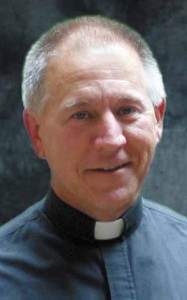By Fr. Bud Grant

Prior to the reintroduction of wolves into Yellowstone National Park ecologists invested in exhaustive research into such seemingly esoteric subjects as the contents of elk manure. One can imagine the reaction of certain radio talk show hosts to this egregious example of government waste…
But it wrought much-needed information. Elk browse; they nibble on twigs, which reduces berry production. Bears need that food source to get through hibernation. Wolves knock back the elk population, berry bushes produce more, which means more bears. Bears also eat elk: more bears, fewer elk; fewer elk, more berries; more berries more bears. Don’t forget, wolves are the trigger to this population recalibration, which results – hopefully — in a cyclical population ebb and flow among these ecological players.
And that is only one symbiosis: scientists examined relationships among myriad ecological factors in a system too complex for anyone to thoroughly grasp, then made their choices. Isn’t this playing God? Mike Saxton, an ecologist with experience in the Nachusa Grasslands in Illinois, describes it this way: “Our work is that of trial-and-error and we learn by doing, with our boots on the ground and our hands covered in soil. With our fingers on its pulse, we diagnose ills, prescribe cures, and doctor the land. We share in our successes and failures and as the prairie heals, we learn and grow together…”
But shouldn’t we just leave it alone? Well, no. Imagine your neighbor deciding to let her yard go “native” by no longer mowing it (tempting, isn’t it?). The result? In a word, weeds. It would not go back to anything like a pristine native grassland: too many species missing, too many aliens and no fire. If she wants a no-mow prairie, your neighbor must heavily invest over several years to nurture it into existence. It will always need her intervention and, unless she does burn, she will even have to mow it occasionally. Though it sounds a bit odd to say it, nature must be managed.
We are nature’s managers. We always have been, to one extent or another, more or less consciously, since we dropped from the trees. Now, because we have so dramatically, permanently and, it must be said, harmfully, altered the global land, sea, and skyscape, nature cannot heal itself without help. The problem is that we can never know enough to ensure that the decisions we make for nature will be the right ones: re-introduce wolves? Secure fish-spawning habitat with sunken subway cars? Regenerate extinct species? These are scientific, moral and even spiritual questions, with at least one common goal, which is, according to ecologist Chad Graeve, to “restore processes that drive a system.” Put another way, the goal is the “restoration of a balanced relationship” among the diverse members of the ecological community … including us. This is moral because we have wounded those ecological relationships. Spiritual because healed natural relationships begin to realize our relationship with God, whose Son was indelibly scarred while incarnate among us.
We do not know all that we ought to know in order to avoid mistakes. But we must try: not to manage nature is to mismanage it. Our generation will be defined and judged by our response. Mike Saxton’s experience is instructive: “restoration is neither for the faint of heart nor for those seeking quick returns. Prairie time is slow time and what took millennia to evolve and a single plow-pass to destroy cannot be restored in a day, a week or a field season. It takes years of blood, sweat and tears, with a little bit of luck along the way … for me, however, the trials of the prairie … the bug bites and parsnip burns, the hot sun and the hotter fires, the late nights and early mornings, the weeds and the seeds, the aches and the pains … define what we do.” To this we now can happily add, the howling of wolves.
(Father Bud Grant is a professor of theology at St. Ambrose University in Davenport.)







